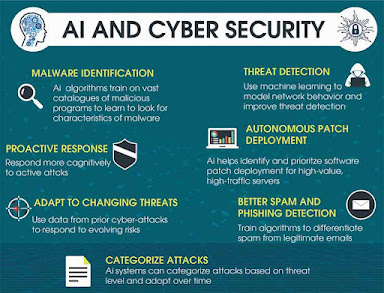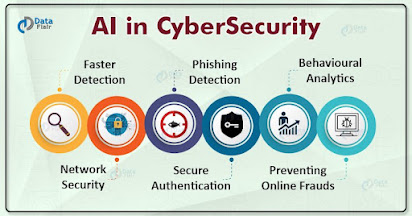We all are well aware about the terms cyber security and Artificial Intelligence but they are far ahead of the basic definitions given in the dictionaries . Now , when we are here to discuss about the collaboration of these two giant techs , it is something worth a discussion . Let's get into it in this blog where we explore in detail how this collaboration is going to make a difference ...........
What is Cybersecurity?
Cybersecurity is the practice of protecting critical systems and
sensitive information from digital attacks. It mainly aims to reduce the risk of cyber attacks and protect against
the unauthorized exploitation of systems, networks and technologies by some sinister techies . It is
basically a barrier raised against any malicious intent in the cyber
space and not just related to protecting your passwords .
What is Artificial Intelligence?
Artificial intelligence is the process of mimicking human
intelligence . The field of AI is booming in the recent past and has widespread
applications in almost every domain you can think of. Healthcare,
transportation, business, education and numerous other pillars of our
society are deeply impacted by AI . Thanks to AI that the ALEXAs and SIRIs are existing in this busy world to make our life easier .
How AI impacts Cybersecurity?
Cybersecurity is also one such field which can be incorporated with AI to
our benefit. In an ever-changing cyber landscape, it is important and rather a
necessity for enterprises around the globe to stay informed and alert to
counter cyber threats and attacks. To tackle this alarming issue, the collaboration of AI with cybersecurity
is a powerful solution.
On one hand, artificial intelligence in cybersecurity benefits security
experts by improving how they investigate, analyze and comprehend
cybercrime. It improves the cybersecurity technology that businesses use
to fight fraudsters and keep their customers and employees secure.
Artificial intelligence, on the other hand, can be exceedingly resource
intensive. It might not be appropriate in all situations. More
crucially, it can be added to the arsenal of hackers who utilize
technology to hone and improve their hacks.
Advantages of AI in cybersecurity
As mentioned earlier artificial intelligence is an attempt to mimic human
intelligence. It has enormous potential in the field of cybersecurity.
Artificial Intelligence (AI) systems can be trained to provide threat
warnings, identify new types of malware, and protect critical data for
businesses if used correctly. To operate effectively and protect their
organizations from cyber assaults, security professionals require
significant help from intelligent machines and innovative technology such as
AI.
Let's have a look at some of the important advantages of leveraging AI in
cybersecurity:
-
Speed: AI can sort through vast amounts of data much faster than human
analysts. When coupled with automation techniques and RPA (Robotic Process
Automation), this faster analysis can deliver faster actions thus reducing
the mean total time to contain a breach, a key cybersecurity metric.
-
Robustness: Although it's not the case that AI is always right, AI
algorithms are typically highly consistent. This minimizes the likelihood
of errors due to inconsistency, which are common errors in any human
activity.
-
Identification of unknown threats: A human being may not be able to
identify all the threats a company faces. Every year, hackers launch
hundreds of millions of attacks with different motives. Unknown threats
can cause massive damage to a network. Worse still is the impact they can
have before you detect, identify and prevent them. AI has proven to
be one of the best technologies in mapping and stopping unknown threats
from ravaging a company.
Downsides of AI in cybersecurity
However, just as there are two sides to a coin, there are significant
drawbacks to deploying AI in this industry. Organizations would require
significantly more resources and financial investments to establish and
operate an AI system.
Furthermore, because AI systems are educated utilizing data sets, you'll
need to collect a variety of malware, non-malicious code, and anomaly sets.
Obtaining all of these data sets is time-consuming and expensive, which most
businesses cannot afford. Inefficiency in training the model can also lead
to major security breaches which can often lead to situations which cannot
be resolved easily.
AI systems can produce inaccurate conclusions and/or false positives in
the absence of large amounts of data and events. Obtaining erroneous data
from untrustworthy sources might sometimes backfire.
Another significant disadvantage is that thieves can use AI to study their malware and execute more sophisticated attacks, which increases the risk of a cyberattack . Moreover AI is a mimic of human intelligence which can never replace human intelligence. It may be true that machines perform much more efficiently as compared to
a human being. But even then it is practically impossible to
completely replace humans with AI based models especially when it is
into field like cybersecurity .
Use cases
1. Log analysis
AI is ideal for problems that require automated correlation and assessment
of large volumes of data. The challenge for cybersecurity professionals is
often to translate information (the output of device, network and system
logs) into knowledge (security alerts). Human security analysts don't have
the mental or physical bandwidth to process these high-volume data streams
and determine which combinations of data points equate to security alerts or
events.
AI tools can find commonalities across disparate data feeds and convert
data points into actionable events for analysts, thereby reducing the time
required to uncover and respond to attacks. Log analysis tools that rely on
AI and ML include products from Splunk, SolarWinds and LogRhythm.
2. SOC Automation
Combining AI with robotic process automation (RPA) can reduce the time
required to react to critical events. Essentially, AI plus RPA means that
security analysts can preconfigure automated responses to ensure that if the
AI uncovers a certain scenario (scenario X), the appropriate action (action
Y) will be undertaken. One benefit of using AI in this context is that it enables these tools to
learn over time.
3. Behavioral threat analytics (BTA)
The broad category of behavioral threat analytics (BTA) is an area in which
AI provides a much-needed assist. Products that deliver BTA include those
classified as user behavior analytics (UBA) or user and entity behavior
analytics (UEBA), such as tools from Securonix, Exabeam and Splunk.
4. Digital forensics and auditing
Another area in which AI can assist cybersecurity initiatives is when it
comes to digital forensics and auditing. These efforts require sorting
through large volumes of data to determine patterns that can uncover the
anatomy of attacks and help identify perpetrators. AI-based digital
forensics providers include Exterro Smart Investigator, IBM, LogRhythm and
Paraben.
5. Threat hunting and monitoring
Threat hunting and monitoring is another great application for AI within
cybersecurity. As the name implies, threat hunting and monitoring solutions
review a range of data sources such as logs, information about an enterprise
environment and external threat monitoring or threat intelligence feeds to
quickly determine whether an enterprise is at risk of attack.
Conclusion
Since the inception of AI , it is highly known that in order to make the
right AI system , we need the right data further we have to train the AI
model with this right data which has to be further tested for bias and to
ensure that it is robust. If rightly implemented AI can provide accuracy of
detection , it can help accelerate investigation and further can provide us
with proactive mechanisms of protection . AI can never remove the human
intervention in the field of cybersecurity but definitely it can help boost
the productivity as well as assist in a massive scale. Both AI and
cybersecurity are technologies developed , maintained and executed by human
beings , so the collaboration of them is definitely going to be a boon in
the long run.
Authors :









0 Comments